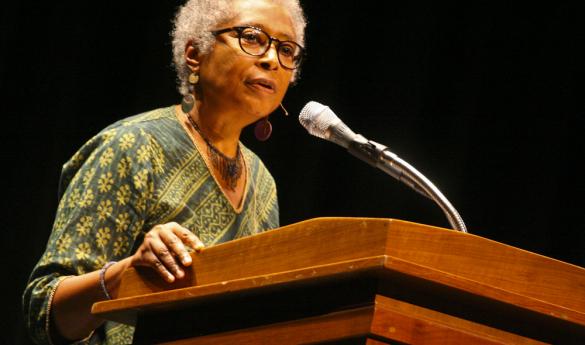Alice Walker visits Mason for Fall for the Book
There are many novels that capture an audience’s attention. Works such as “The Great Gatsby” and “The Giver” are often read in high school and college literature classes because of their wide acceptance in the literary world. The novel “The Color Purple” is no exception. Winner of the 1983 Pulitzer Prize for fiction, author Alice Walker’s work continues to have a deep impact on readers alike, even thirty years after it was first published.
At this year’s Fall for the Book Festival, Walker was one of the highlights. Andy Shallal, founder of D.C.’s Busboys and Poets, recommended Walker for the event and was instrumental in convincing her to attend. “Being asked by [Shallal] made it a little easier to decide to come to D.C. all the way from California,” Walker explained.
“The Color Purple” is a narrative that revolves around the lives of two sisters, one in Africa and the other living in Georgia during the 1930s. Walker looks at conditions for black women in the South during this time period, how they survive and how these women challenge the religions, organizations and individuals oppressing them.
Walker wrote the novel as a way to “spend more time with [her] ancestral family, particularly [her] grandparents.” She spent a year writing “The Color Purple” while she was living in New York, and later, after moving to California, she finished the novel on the west coast.
“I knew I needed to write this book, and so I moved to California,” Walker said.
(Photo courtesy of Alice Walker).
 Even after thirty years, the characters and storylines in “The Color Purple” are still relatable to audiences today. Walker sees her work as something from which readers can continue to take something away: “People often suffer from challenges. To see [the characters] challenge this [suffering] resonates with people around the world, because they are still relevant,” Walker said.
Even after thirty years, the characters and storylines in “The Color Purple” are still relatable to audiences today. Walker sees her work as something from which readers can continue to take something away: “People often suffer from challenges. To see [the characters] challenge this [suffering] resonates with people around the world, because they are still relevant,” Walker said.
Walker also commented on the relationship between her characters and her readers with regard to “The Color Purple” saying, “People see characters as their fathers, brothers, sisters, mothers; as people they live with.”
“The Color Purple” is an American novel, but its text has been translated into several languages. Because the novel uses colloquial speech from the 1930s, the translations posed a problem. Walker was concerned that some of the words’ meanings would be lost in the translation. When she was asked about these specific sections of dialogue, Walker encouraged translators to write it in “their own ancestors’” speech.
The very meaning of the novel posed a problem when being translated. Since international readers were not necessarily acquainted with American history, the history of the South “is quite severe,” Walker said.
However, in 1983, before Walker was offered a contract for the Chinese translation, she visited China where some of her friends had already read the novel in a non-official translation. Despite the American themes, they told her that, “Actually, it’s a very Chinese story.” Walker explained that the oppression of women translates through similar actions, not words.
“The Color Purple” has also been translated into film and theater. Taken on by Stephen Speilberg, the book was adapted into a movie in 1985. Initially Walker did not like the adaptation because she noticed how much was missed, “knowing [that] parts end up on the cutting room floor.”
However, through her relationship with Stephen Spielberg while working on the film, Walker has grown to enjoy the film adaptation, because she realized “how difficult it is to adapt it, from something that takes someone ten hours or so to read and taking that to fit into something that is ninety minutes is difficult.”
However, despite the parts left out of the film, Walker says she loves the movie and finds it, and the musical, to be “very moving… especially moving for [her].” She loves the music that was made for the book’s adaptation and respects the people who made both the film and musical.
When asked if there was anything specific she wanted to address during her speaking engagement at Mason she replied, “I don’t have any preconceived ideas, I am simply bringing myself.”
Alice Walker spoke on Thursday September 27 at the Center for the Arts.

